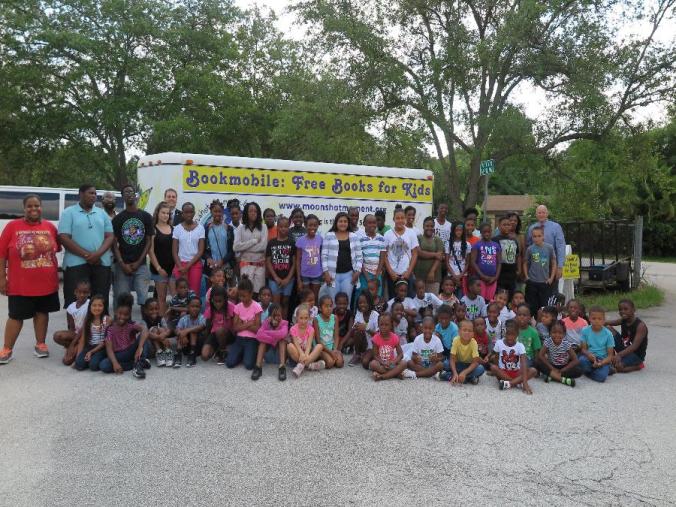
INDIAN RIVER COUNTY (IRC) SHERIFF DERYL LOAR ISSUED A PRESS RELEASE ON NOVEMBER 10, 2016 TO ANNOUNCE THAT THE SHERIFF’S DEPARTMENT WAS SUPPORTING THE USE OF THE MOONSHOT MOMENT BOOKMOBILE ON NOVEMBER 14, 2016 TO DELIVER FREE BOOKS TO FAMILIES THROUGHOUT IRC.
In so doing, the IRC Sheriff’s office, in conjunction with other local law enforcement agencies (Fellsmere Police Department, Sebastian Police Department, Vero Beach Police Department) was supporting the Learning Alliance’s third annual Moonshot Moment Day of Service on November 14th, 2016.
The Learning Alliance, who hosted the event, is the the umbrella 501 (c)(3) not- for-profit organization for the Moonshot Moment.According to the Sheriff’s release, “This puts a new spin on being ‘booked’ by the police.”
The goal of the effort was to ensure that every family has age-appropriate books in their home.
According to the Children’s Literacy Foundation, 60% of low-income families have no age-appropriate books in their homes. Having books in the home has been proven to improve a child’s reading performance, cause children to read more and for longer lengths of time, and produce improved attitudes toward reading and learning among children.
Children who live in print-rich environments and who are read to during the first years of life are much more likely to learn to read on schedule, which is 90% childhood literacy by the third grade.
That is the mission of the Learning Alliance’s Moonshot Moment initiative. It is to empower community leaders, parents, and front line educators with the literacy tools, knowledge and support necessary to enable children to read by third grade.
The Learning Alliance launched Moonshot Moment only three years ago. Now it boasts 70 community partners, a school board and school district leadership team, 13 participating elementary schools, over 70 volunteers and 4,000 students all working to ensure that 90% of all third graders in Indian River County will be reading proficiently by 2018.
Critical building blocks for 90 percent literacy include the following:
- Vocabulary: Knowing the meaning of a word in the text.
- Decoding: The process of translating that word into a sound.
- Comprehension: The ability to understand and gain meaning from what has been read and communicate it to others. It is the reason for learning.
- Fluency: The Bridge between decoding and comprehension.
- Orthographic: Rules of spelling, hyphenation, capitalization, word breaks, emphasis and punctuation.
- Phonological: The identification and manipulation of units of oral language parts such as words, syllables, and onsets and rimes.
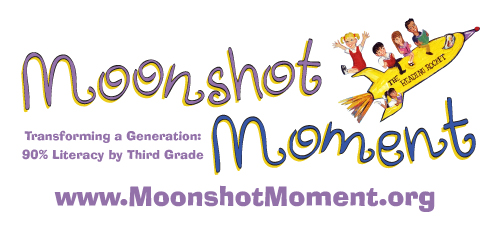
The Moonshot Moment has an institute to conduct workshops, which emphasize that students become better readers when they have fun learning to read. Playing games is a great way to provide additional practice with early learning skills.
As an example, a session revolved around introducing into the classroom the textbook Manfish, A Story of Jacques Cousteau, by Jennifer Berne.
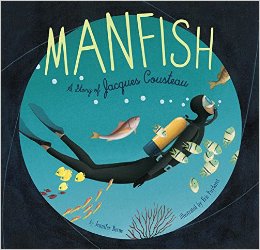
This session taught teachers how to use a visual arts technique called paper cutouts for students to make thinking and understanding words a visible experience. Learning is much more relevant when you create something. Additionally, using scissors correctly to make the paper cutouts can also help with pencil control skills.
A similar session involved the text The Boy Who Harnessed the Wind: “The true story of a boy whose great idea and perseverance lit up his home and inspired the world.”
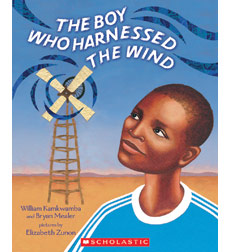
William Kamkwamba is the boy who harnessed the wind. He gained fame in Malawia, when in 2002 he used blue gum trees, bicycle parts and materials from a scrap yard to build a windmill to power a few electrical appliances in his house in Wimbe.
In this session teachers were guided on how to have their students embrace how William harnessed the wind by having them build pinwheels to copy, so to speak, William’s windmill and then discuss how their own windmills (pinwheels) capture energy. This kind of experimentation developed a sense of wonder and inquiry in science.
After building their sculptures, students brainstormed what they might do with the energy they harnessed. How might their energy create motion or change the world? Then the students wrote poems from the perspective of their sculptures.
Using their poems, students engaged in a Role Play being William, demonstrating their understanding of the key details of the text. Manfish and The Boy Who Harnessed the Wind were selected because they featured individuals who changed their world through curiosity, inquiry and wonder, thus exploring our essential question: How do we change our world?
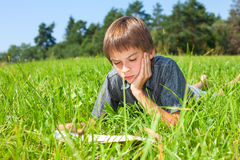
Children who learn to read by third grade, will read to learn thereafter.